QUITO, Ecuador— The National Strike this summer in Ecuador mobilized people from all 24 of its provinces, concentrated thousands of protesters in the city of Quito, and lasted 18 days. Although it has left as a consequence, so far, seven people dead, this new social outbreak compelled important advances in the fight for the defense of Indigenous territories from the oil and mining industry, in addition to the promise of economic relief for the already battered situation that confronts Ecuador.
On June 30, under the mediation of the Ecuadorian Episcopal Conference, the peace agreement signed between representatives of the national government including President Guillermo Lasso and three indigenous organizations (Confederation of Indigenous Nationalities of Ecuador, or Conaie; Council of Evangelical Peoples and Nationalities of Ecuador, or Feine; and, National Confederation of Peasant, Indigenous and Black Organizations, or Fenocin), put an end to popular mobilizations and state repression.
Para leer este artículo en Español haz click AQUÍ
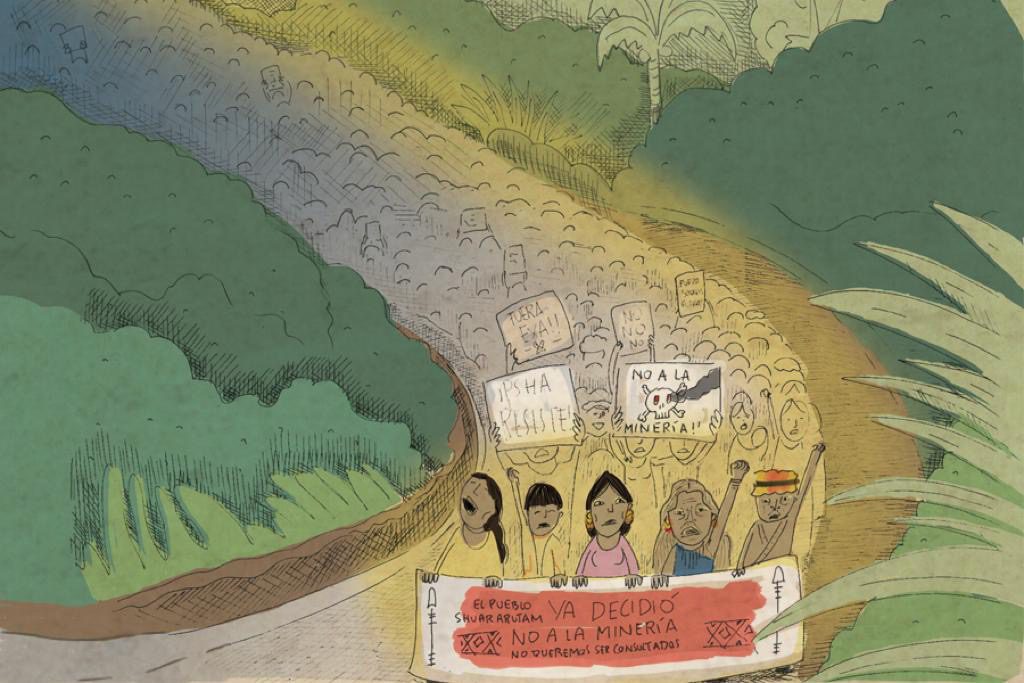
The 10 demands of the National Strike that motivated this new uprising were accepted by both sides on numerous points. Among other challenges, the following stand out:
- Reduction in the price of fuels and establishing targeting policies—that is, that the prices to be paid are considered based on the level of income of the consumers; financial relief for bank credit debtors;
- A repeal of Executive Decree 95 promoting oil extraction, which implies that at the moment it is not a priority issue for the state’s agenda;
- Declare an emergency in the health sector;
- Double the budget for intercultural bilingual education
- Reform Executive Decree 151, whose current mandate establishes the mining policy action plan in the country; and finally,
- Guarantee the prior, free and informed consultation of the communities regarding any use of their lands regarding approval of projects affecting their lands, territories and resources, as established in ILO Convention 169 and the Ecuadorian constitution itself.
The issues and approaches that will guide public policy and determine the future of the majority of the Ecuadorian population are being discussed at dialogue roundtables, in the presence of guarantors and with a methodology for monitoring the agreements. Since July 13, five of them have been installed:
The issues and approaches that will guide public policy and determine the future of the Ecuadorian population, the majority of whom have been hard-hit by economic upheavals, are being discussed at dialogue roundtables, in the presence of guarantors and with a methodology for monitoring the agreements. Since July 13, five such roundtables have been installed:
- Fuel subsidies policy
- Financial system moratorium
- Price control policies and speculation in the market for basic necessities.
- Extractivism and natural resources/CTEA (Amazon Territorial District Reform, entity responsible for planning that region).
- Fair prices for farm products and agricultural development.
The remaining five will be:
- Collective rights of indigenous peoples
- Security, justice and rights
- Access to health and intercultural health
- Employment and labor rights
- Access to higher education and intercultural education.
Biologist Patricio Meza, a member of Conaie’s technical team, in an interview for this article, said that the first two roundtables have achieved important results.
First, a progressive fuel subsidy policy has been established, so that those who earn more than $42,000 USD per year ($3,500 per month) on average would not have the benefit of the subsidy but would pay the real cost of fuel. For the matter of accumulated debt, benefits have been achieved with public banks, but the opening of private banks and officialization by the government is still awaited, he says.
The roundtable on extractivism and natural resources was installed on Wednesday, August 24, to deal with three highly sensitive issues: oil, mining and the reform of the Amazon Territorial Circumscription (CTEA).
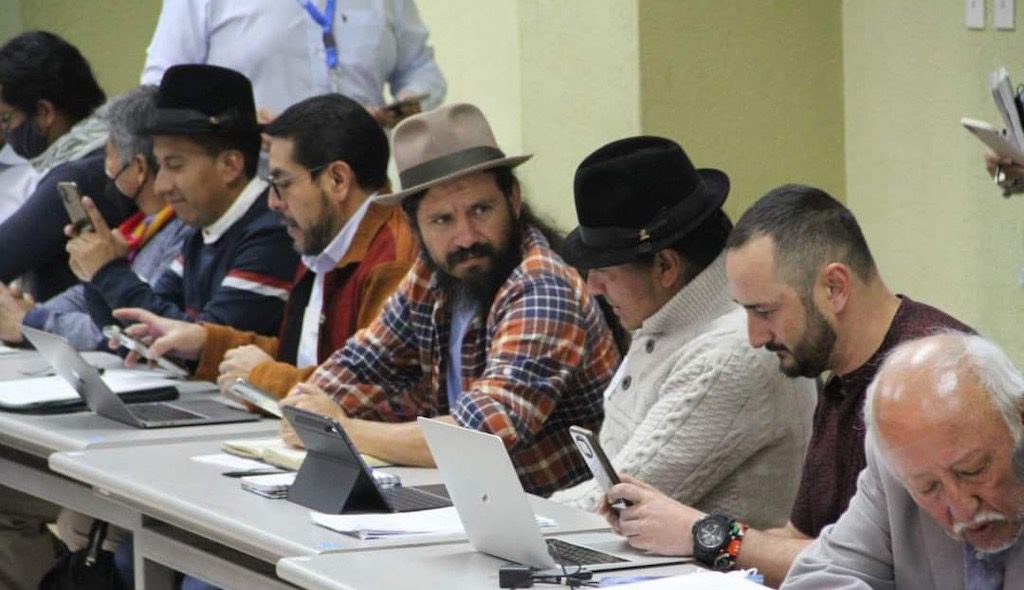
Regarding mining, in Point 5 of the 10 demands raised by Conaie, there is talk of a mining moratorium on all concessions that have conflicts or legal issues to be resolved. Throughout the country, social and indigenous organizations, together with their bases, have obtained sentences in favor of the communities in extractive areas when they have seen their rights violated.
The most emblematic are those granted in favor of Sinangoe and Los Cedros. “The idea is to declare the country free of mining, but we know that under these conditions, at this juncture, it will be difficult to accede to that request, so we are going to try to at least reach some agreement on these minimum points,” Meza said. The exclusion of indigenous territories, water sources and biodiverse areas has been requested, said the expert, but also “that the will of the people expressed through popular consultations that have already been carried out in the country be respected.”
The three popular consultations to which Meza refers took place in 2018 (at the national level) and 2022 (at the local level in the cantons of Cuenca and Girón, in the south of the country, province of Azuay), respectively. The so-called “7 Times Yes” consultation, held on Feb. 4, 2018, convened by then-President Lenin Moreno, asked in question 5: “Do you agree with amending the Constitution of the Republic of Ecuador so that metal mining in all its stages, in protected areas, intangible zones and urban centers, is prohibited without exception, in accordance with the provisions of Annex 5.” The measure gained 68 percent national approval. Meanwhile in Cuenca and Girón, on February 1, 2021, (at the same time as the presidential election of Guillermo Lasso), 80% and 86% of the population, respectively, voted in favor of prohibiting it.
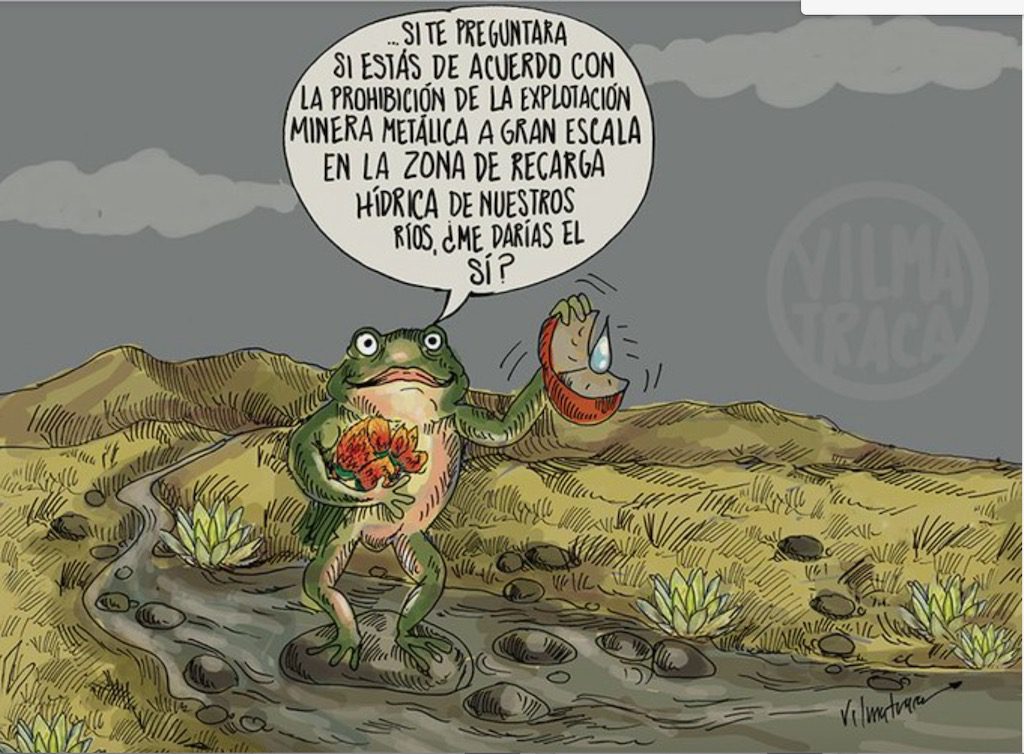
However, the popular consultation is not retroactive; that is, even if mining extraction is prevented from now on, the current concessions would not stop, which would put sensitive ecosystems at risk due to their high concentration of biodiversity and community life, and some communities decided to oppose its realization. For example, in Azuay, the protective forests that surround the El Cajas National Park and the water sources of the Quimsacocha reserve would still be at risk. For this reason, continues Meza, “an audit is requested of all the bidding processes for concessions that have been granted permits and the issue related to the administrative and productive aspects of the projects that are in the extractivism phase, such as the projects Viewpoint in Tundayme and Fruta del Norte in Zamora Chinchipe”, he points out.
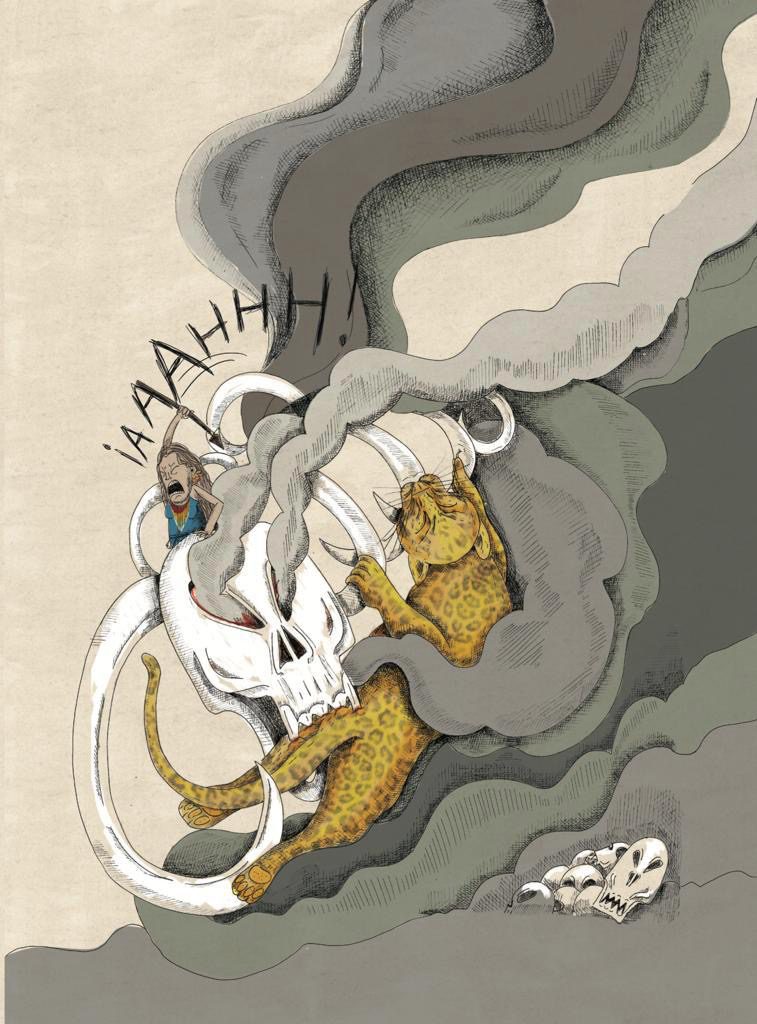
In the Cordillera del Cóndor, in southeastern Ecuador, about 60% of the territory of the Shuar Arutam People is concessioned to various mining companies such as Solaris Resources, EcuaSolidus S.A. (Canada), SolGold (Australia) and ExploCobres S.A. (China). In 2016, during the government of Rafael Correa, the leader of the Shuar Federation (FICSH), Agustín Wachapa, was arrested and his territory militarized.
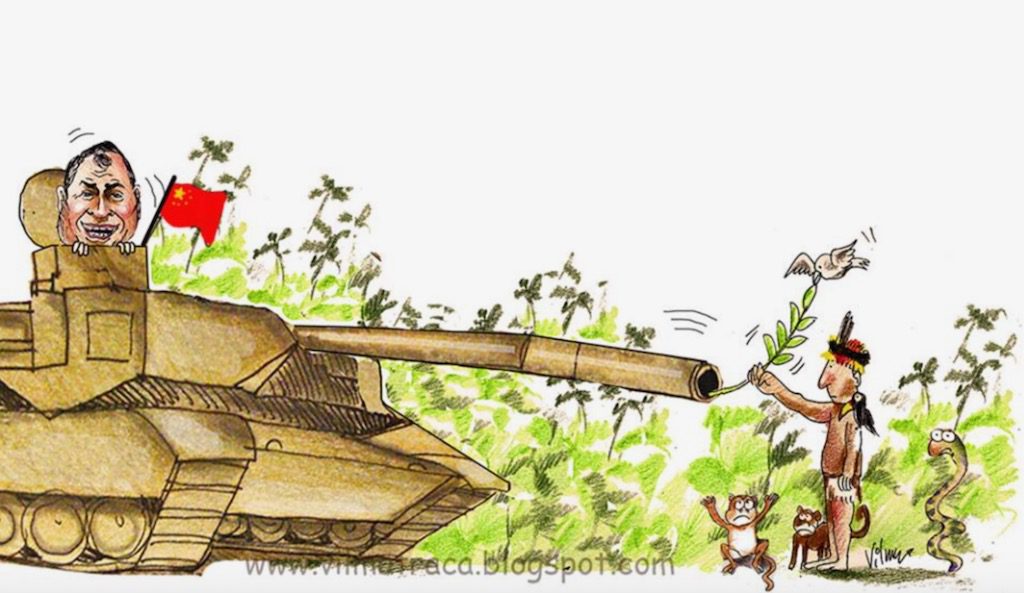
Another case of military violence also occurred in the province of Imbabura, a rural community in Buenos Aires, due to the concession granted by the current president Guillermo Lasso to the Hanrine mining company in 2021.
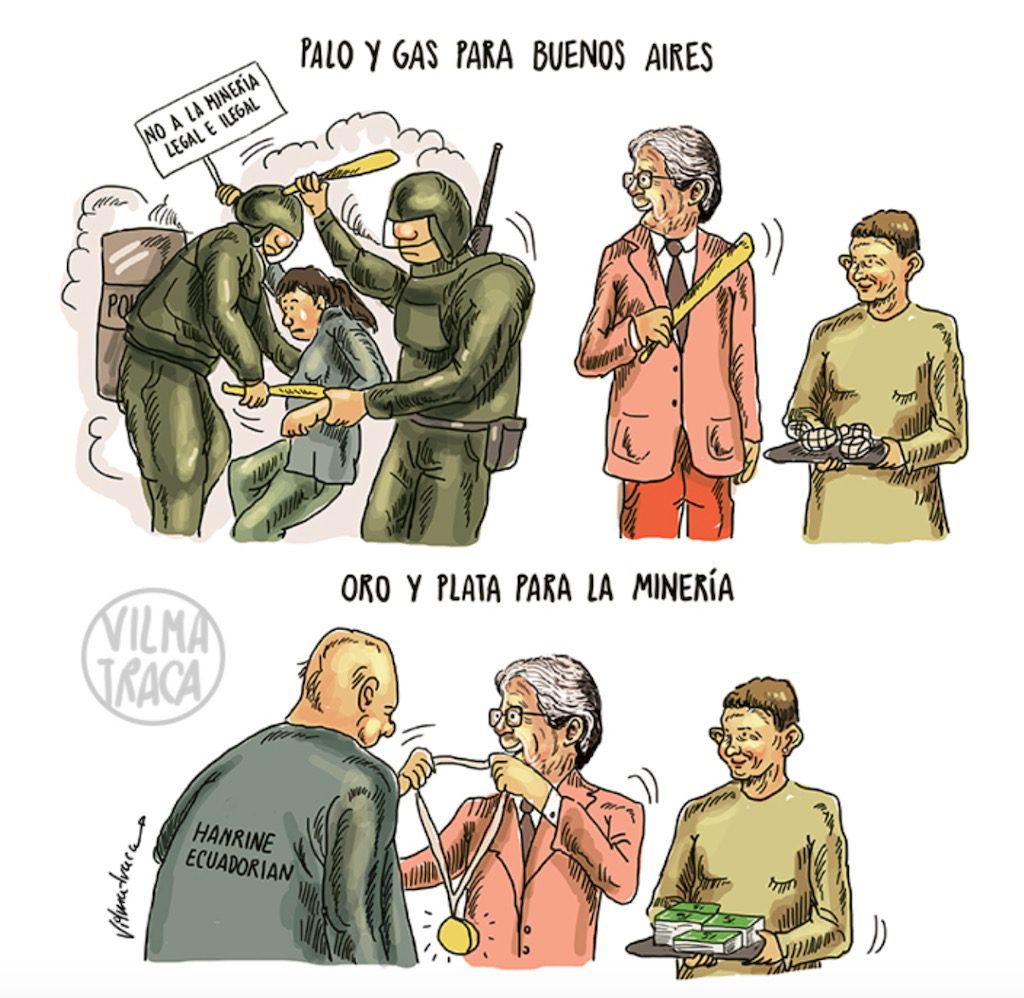
As a result of the National Strike, Executive Decree 468 was issued on June 30 in which—as in the current Ecuadorian Constitution—it is specified that this activity cannot be carried out in protected areas, intangible zones, archaeological zones, water protection areas and ancestral territories of indigenous peoples. In addition, it guarantees prior, free and informed consultation with the communities. Executive Decree 151, which establishes an action plan for the country’s mining policy, is awaiting substantial reforms.
One of the most sensitive issues in terms of large-scale mining in Ecuador is the impact on the water of the populations, since both the exploration and exploitation phases are highly harmful. Ninety-five percent of the concessions granted in Ecuador are for metal mining, according to the Critical Geography Collective. Metal mining, which is in the process of being implemented, is the most polluting type of mining.
Melissa Moreano, a member of the collective, is decisive in affirming: “In Ecuador, mega mining has no place and the attempt to impose it is a clear example that the states do not command their national policies but rather that it is the transnational power that does. Mining is not a national project.” Regarding water sources, she observes that “Ecuador is a small, densely populated country and almost every body of water is used for subsistence, irrigating the pastures and crops of rural populations. In addition, they are thinking of mining in the moors, which is where almost all the water that supplies the country is born, ”she explains, alarmed.
Moreano attended a recent launch event for the graphic story Josefina and the struggle of the Shuar Arutam People about Josefina Tunki, the first woman to preside over the Shuar Arutam People, who faces death threats due to her opposition to mining on Indigenous lands. Moreano shared these observations on water sources and the rights of peoples, among other implications of the impact of large-scale mining in Ecuador, explaining why the city of Quito would also be threatened if the concessions in the northwest took place: They are located precisely in the rural areas of Quito, which would affect the water sources of their towns. Around this, a campaign has been articulated to carry out a new popular consultation, #QuitoSinMinería.

“People from all over the country come to the extractivism table: Carchi, Imbabura, Northwest Pichincha who are also with the consultation, Cotopaxi, Bolívar, Chimborazo, Azuay, Loja, Zamora, Napo, Sucumbíos, practically the entire country where there are mining, articulated to the national anti-mining front. People arrive motivated to expect what might happen. Conaie has generated hope,” says Meza.
“The days are long but even so the solidarity expression of the people has been felt. There are people who go voluntarily to contribute to the construction of the proposals in these roundtables. They are multidisciplinary technicians or they are called by the organizations. The solidarity kitchens are still working and there is food left over from the strike. The support keeps coming.”
Two months after the national strike, the peace act continues its process and could mean an important step towards more inclusive public policies.
Meza hopes to be able to reach agreements with the government based on their proposal for the non-expansion of the oil and mining borders.
“This way there will be a change in public policy, to leave the extractive stage for a post-extractivist stage that generates well-being for the entire population,” said Meza, ”considering that campesino and indigenous populations conserve life in the forests, which allows life on the planet, and that they are the ones who also generate production that feeds the cities.”
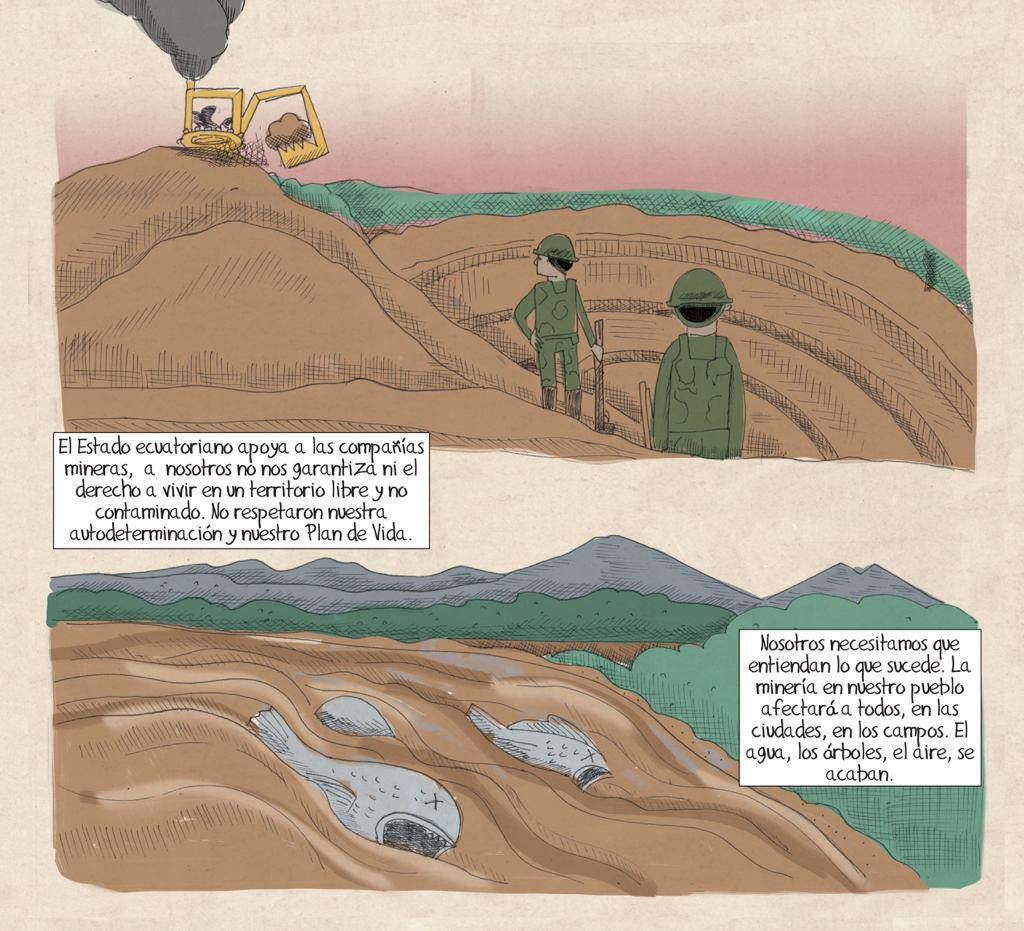
- Ecuador: After National Strike, extractivism and equity debate begins - September 8, 2022
- 18 days of resistance: Women leaders in Ecuador speak out - July 3, 2022